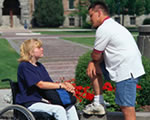 Go to main content
Go to main content
Archive Website of the UK government
Please note that this website has a UK government accesskeys system.
Main menu
Page menu
Money, tax and benefits

The Independent Living Fund

The Independent Living Fund (ILF) makes payments to disabled people to help them lead a more independent life. The ILF is permanently closed to new applications.
Future of the Independent Living Fund (ILF) consultation
This consultation seeks views on the impact that closing the Independent Living Fund (ILF) in 2015 would have on users, local authorities and the wider care and support systems across the UK. The Government would also like your views on how closure could be managed in a way which would minimise disruption to the care and support needs of existing ILF users. Responses are required by 10 October 2012.
You can find out more about the consultation on the DWP website.
About ILF
The ILF was set up as a national resource to enable disabled people to live independent lives in their community rather than in residential care. You can use payments from the ILF to pay a care agency or employ someone to give you personal and domestic care, or both.
To continue to receive funding from the ILF, in the majority of cases you must:
- be living in the UK for at least 26 weeks a year
- get social services support worth at least £340 a week or £17,680 a year - this can include direct payments or services from your local council, like going to a day centre
- get or be entitled to the highest rate care component of Disability Living Allowance
- have less than £23,250 in savings or capital - this includes any money your partner has, if you have a partner
Find out more about the ILF by downloading ‘Living’ - the ILF newsletter.
Your award
The amount you get is based on the cost of the care you need, worked out on an hourly or weekly basis.
The maximum amount the ILF can award you will depend on when you applied. Your savings, income and certain other benefits and expenses also affect how much you get.
The page 'The Independent Living Fund - how your payments are calculated' has more information.
How the money is paid
Independent Living Fund payments are made directly into your account. This might be a bank, building society, Post Office or National Savings account.
When your award is reviewed, the Independent Living Fund checks the records you keep showing how you have spent your ILF money. For this reason, many people find it helpful to have a separate account for their ILF money.
You can find out more about how to use your money on the page ‘Managing and using your Independent Living Fund payment’.
Effect on benefits
Payments from the ILF do not affect your benefits. In most cases the ILF will take into account half of your Disability Living Allowance towards your care costs.
What you can use it for
You can use your ILF money to pay for support and services. You can use a care agency or employ your own personal assistant for tasks including:
- toileting, bathing, washing and dressing
- eating and drinking
- cooking and shopping
- laundry, cleaning and other household tasks
You may be able to get personal care when you are socialising or at work. The page ‘Employing a professional carer or personal assistant' has more details.
What you cannot use it for
You cannot use payments from the Independent Living Fund to pay for:
- care provided by a partner or relative (including in-laws) who lives with you
- any care provided by social services
- maintaining your home or paying bills
- gardening
- adaptations to your home
- equipment, including wheelchairs
- petrol, taxi fares and other travel expenses
- holidays
- childcare
- private hospital or residential care home fees
- hairdressing, chiropody (footcare) or physiotherapy
This is not a complete list. Please contact the Independent Living Fund to check if you are unsure about whether you can use your payment for a service.
When your money will be reviewed
The ILF assessor visits you after you have been getting ILF payments for six months. They check that you are employing the right amount of care and look at the records you have been keeping. They will visit you every two years to make sure you are getting the right level of payments and you are keeping the right records.
How to appeal
If you are unhappy about a decision or award made by the Independent Living Fund. You can ask for a 'decision review' within four weeks of the decision date. If you do want to appeal then you should contact the ILF.
Information booklets in other formats
Information about the Independent Living Fund (ILF) is available in other formats. If you receive money from the ILF you can contact them to ask for information booklets which tell you more about how it works. These are available in large print, Braille, audio and languages other than English.
How to contact the Independent Living Fund
You can find out how to contact the ILF using the following link.
 Facebook
Facebook Twitter
Twitter StumbleUpon
StumbleUpon Delicious
Delicious Reddit
Reddit